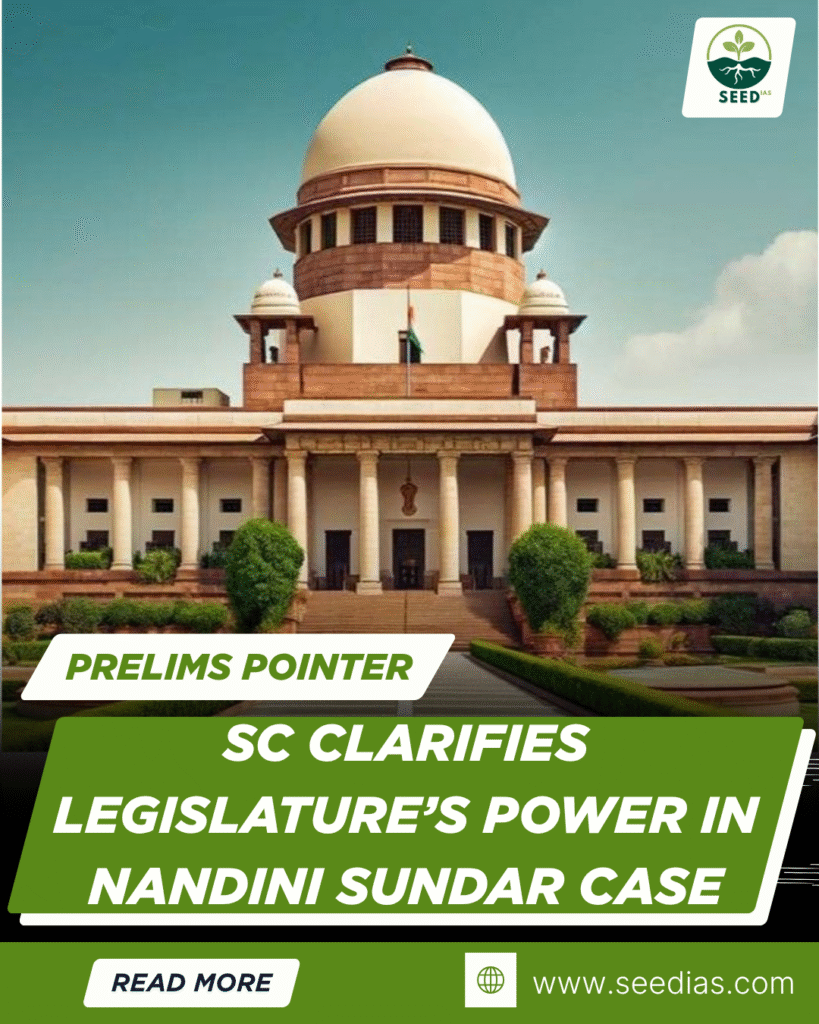Why in NEWS
The Supreme Court ruling in the Nandini Sundar vs. State of Chhattisgarh (2012) reaffirmed the authority of state legislatures to enact new laws, even in response to judicial directives, as long as they remain within constitutional bounds.
Key Terms and Concepts
| Term | Meaning |
|---|---|
| Special Police Officers (SPOs) | Civilian recruits used for security operations, often lacking formal police training |
| Articles 14 and 21 | Right to equality and right to life and personal liberty under the Indian Constitution |
| Contempt of Court | Disobedience or disrespect towards court orders or its authority |
| Ultra vires | Beyond the legal powers or authority granted |
| Doctrine of Separation of Powers | Principle that divides responsibilities among legislature, executive, and judiciary |
Background of the Case
| Year | Event |
|---|---|
| 2011 | SC ordered Chhattisgarh to stop using SPOs in anti-Maoist ops, calling it unconstitutional |
| 2012 | State passed Chhattisgarh Auxiliary Armed Police Forces Act, creating similar auxiliary forces |
| Petition | Filed claiming this new law violated SC’s 2011 ruling |
Supreme Court Ruling Highlights
| Point | Clarification |
|---|---|
| Contempt Rejected | Chhattisgarh was held to have complied with earlier SC orders |
| Legislative Authority | States can pass new laws unless they are unconstitutional or beyond their powers |
| Separation of Powers | Courts cannot prevent legislatures from passing laws; laws can only be challenged on validity grounds |
| Legal Precedent | Reinforced in Indian Aluminium Co. vs. State of Kerala (1996) — legislatures can nullify judgments by removing the basis of law, not by direct overruling |
About Salwa Judum and Koya Commandos
| Term | Description |
|---|---|
| Salwa Judum | Anti-Naxalite civilian militia initiated in 2005 with state backing |
| Koya Commandos | Tribal youth from the Koya tribe, recruited as SPOs under Salwa Judum for armed operations |
In a nutshell
Memory Code: J-U-D-U-M
Judicial respect for compliance
Ultra vires check on laws
Doctrine of separation upheld
Unconstitutional actions barred
Militant youth recruitment challenged
Prelims Questions
- The term “ultra vires” refers to:
a) A constitutional amendment
b) An act beyond legal authority
c) Judicial review of fundamental rights
d) Doctrine of basic structure - In which case did the SC direct the end of SPOs in anti-Maoist operations?
a) Maneka Gandhi vs. Union of India
b) Nandini Sundar vs. State of Chhattisgarh
c) Shreya Singhal vs. Union of India
d) Kesavananda Bharati vs. State of Kerala - What was Salwa Judum primarily associated with?
a) Land acquisition reform
b) Tribal displacement for development
c) Anti-Maoist operations in Chhattisgarh
d) Forest conservation in central India
Mains Questions
- Examine the significance of the Nandini Sundar judgment in the context of the separation of powers and legislative competence. (GS2 – Polity)
- Discuss the constitutional and ethical implications of using civilian youth as Special Police Officers in counterinsurgency operations. (GS2 – Governance/Ethics)
Answer Key Table
| Q.No | Answer | Explanation |
|---|---|---|
| 1 | b | “Ultra vires” means acting beyond one’s legal authority |
| 2 | b | This was the central case concerning SPOs in Chhattisgarh |
| 3 | c | Salwa Judum was a tribal militia for counter-Maoist operations |














